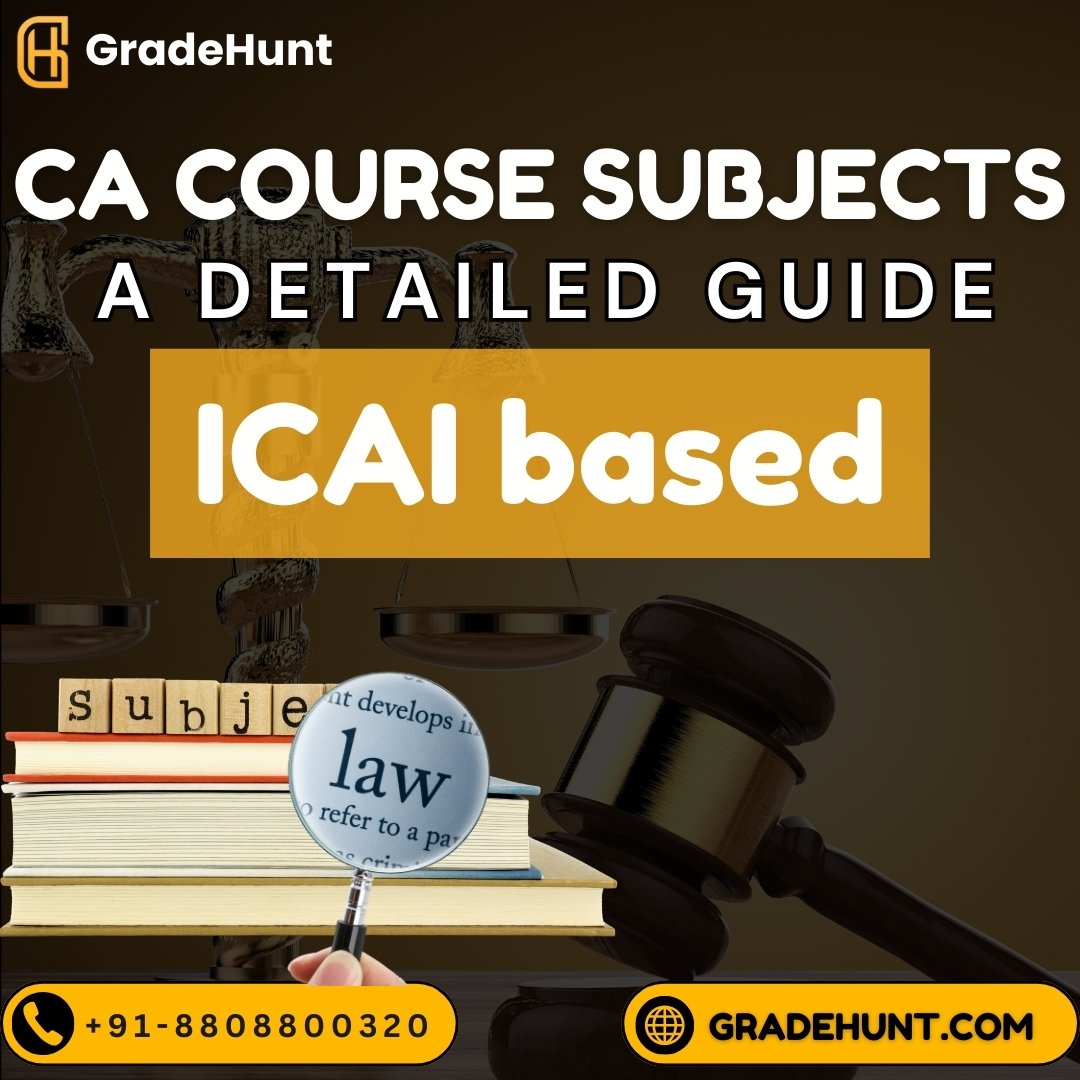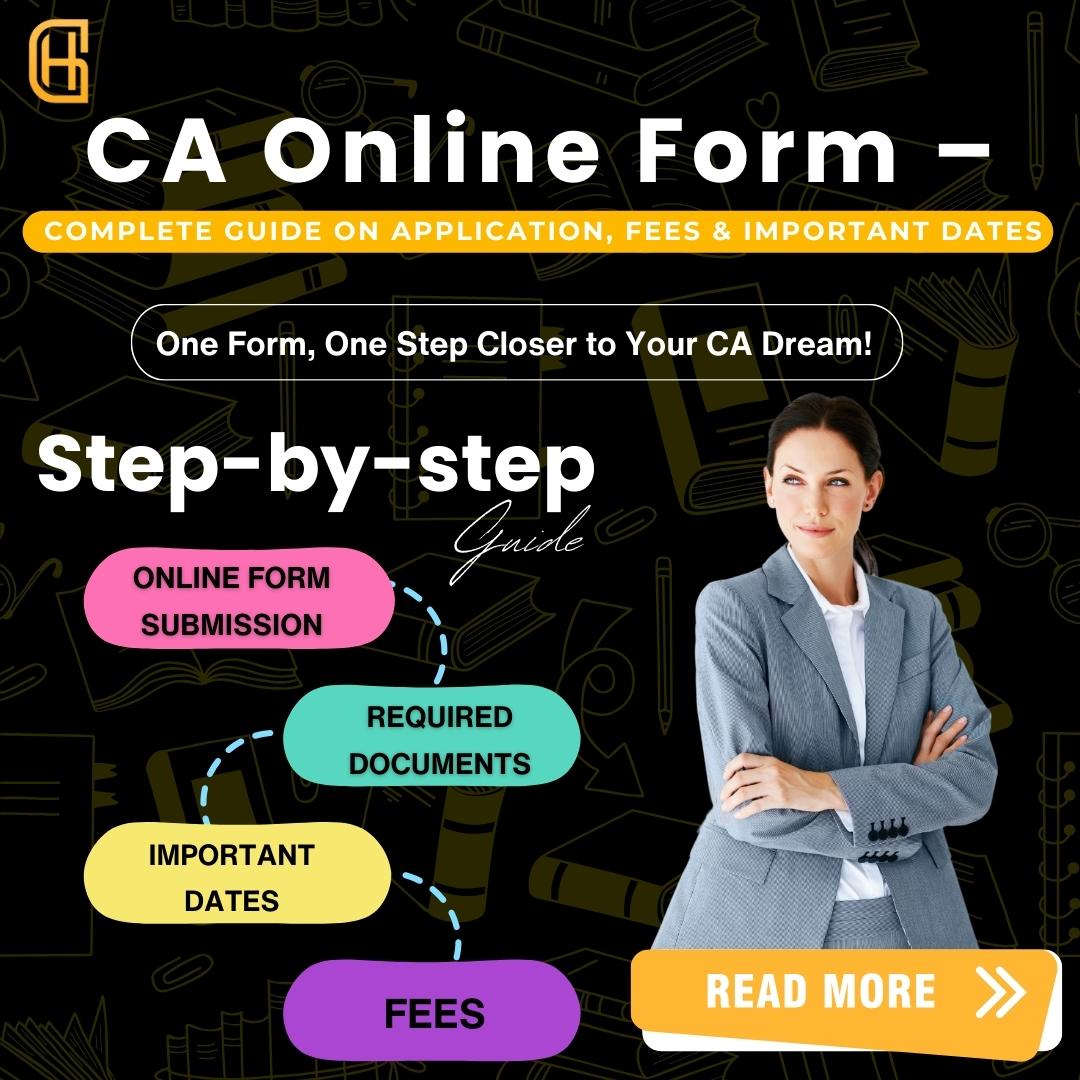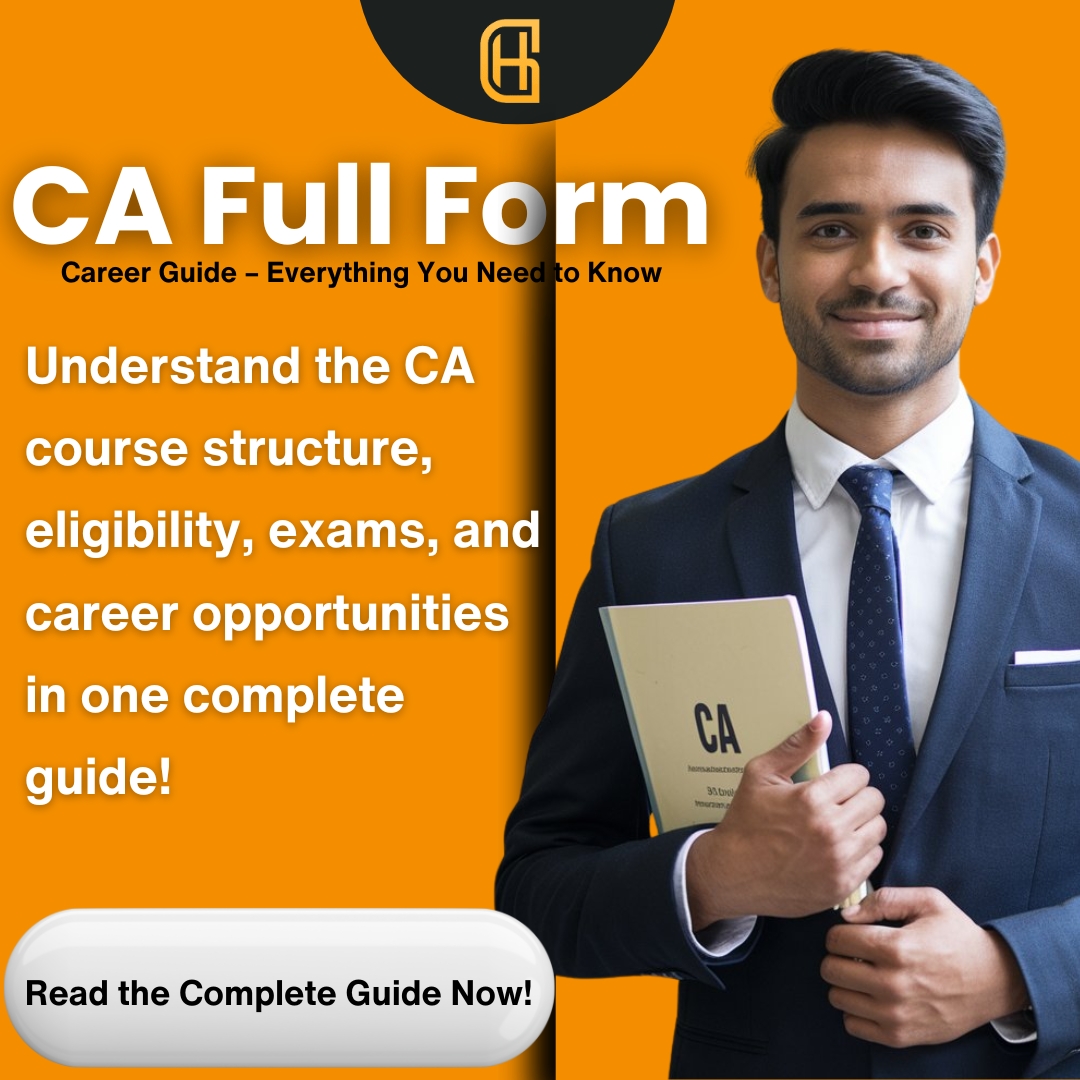
CA Course Subjects: A Detailed Guide
The Chartered Accountancy (CA) professional course stands as a leading difficult program in the finance and accounting domain. The Institute of Chartered Accountants of India (ICAI) presents this qualifying program through three successive educational phases namely CA Foundation, CA Intermediate, and CA Final. Students need to study accounting and taxation together with auditing law and finance at each level of the program.
CA Foundation Course Subjects
The foundational stage of the CA Foundation consists of four subjects for students.
- Students learn essential accounting principles alongside journal entries and trial balance at the first CA Foundation subject Principles and Practice of Accounting. The subject also covers financial statements partnership accounts and company accounts. This fundamental subject supports the progression to higher accounting levels.
- The subject combination of Business Laws and Business Correspondence & Reporting contains two separate parts. The Business Laws section includes important legislation which includes the Indian Contract Act together with the Sale of Goods Act and the Companies Act. The Business Correspondence & Reporting section enables students to develop their communication abilities through business letter writing and report creation together with meeting minute preparation.
- The third subject Business Mathematics, Logical Reasoning, and Statistics teaches valuable analytical techniques to students. The subject requires knowledge of ratio and proportion alongside the time value of money and probability and statistical data interpretation skills.
- The fourth subject combination includes Business Economics and Business & Commercial Knowledge, which delivers knowledge of micro and macroeconomic principles alongside market structure analysis and supply-demand forecasting and business-government policy understanding.
CA Intermediate Course Subjects
The CA Intermediate course consists of two groups, each with four subjects.
Group 1
- Advanced Accounting as the first subject extends the foundational knowledge of accounting by teaching company and partnership accounting as well as company amalgamation and reconstruction among other topics. The subject matter includes company accounts and partnership accounts and combines knowledge of amalgamation and reconstruction of companies and accounting standards.
- The second subject, which is Corporate and Other Laws, contains two distinct sections. The Company Law section in this subject matter establishes legal principles for running companies while delivering information about share capital distribution and director management together with corporate governance protocols. The Negotiable Instruments Act along with the General Clauses Act belong to the Other Laws subsection.
- The third subject of Cost and Management Accounting teaches students about cost control systems and budgeting methodologies and variance analysis and marginal costing and decision-making approaches to enhance business financial efficiency.
- Income Tax and Goods and Services Tax (GST) make up the two parts of Taxation, which is the fourth subject. The Income Tax section teaches students about taxation methods alongside income source calculation as well as available deductions and tax exemptions. Tax registration and structure together with input tax credit procedures and return filing comprise the GST section.
Group 2
- Auditing and Assurance as the first subject provides education in auditing principles combined with internal controls and vouching and verification and company audits. Through this subject, students gain knowledge about financial statement examination procedures for accuracy purposes.
- The second subject of Enterprise Information Systems and Strategic Management divides its content into two sections. Business automation and cybersecurity together with IT system risk management form the core content of the Enterprise Information Systems section. Strategic Management contains three core areas that include business strategy development alongside corporate planning and strategic decision-making.
- Financial Management and Economics for Finance includes two sections among its material. The Financial Management section includes three areas of study: capital budgeting, working capital management, and cost of capital. Economics for Finance presents material that delves into financial markets together with banking systems and foreign exchange markets.
CA Final Course Subjects
The Chartered Accountancy journey ends with the CA Final course, which divides its curriculum into two groups containing four subjects each.
Group 1
- Financial Reporting stands as the first subject, which teaches advanced accounting standards and consolidated financial reporting methods for large companies while exploring financial statements.
- The second subject, Strategic Financial Management, deals with investment decisions, portfolio management, risk assessment, and foreign exchange management.
- The third subject within this course covers company audits along with bank audits and forensic auditing and professional ethics needed for Chartered Accounting practice.
- Corporate and Economic Laws, as the fourth subject, contains information about corporate governance alongside company regulations and securities laws and the Competition Act.
Group 2
- The first subject, Strategic Cost Management and Performance Evaluation, focuses on cost management strategies, performance evaluation techniques, and decision-making models.
- The second subject, known as Risk Management, includes aspects of identifying risks while performing assessments and implementing mitigation plans and financial risk management techniques.
- The third subject, Direct Tax Laws & International Taxation, teaches students in-depth knowledge about direct tax laws together with tax planning and international taxation principles and requirements of tax treaties and cross-border transactions.
- Taxpayers learn about GST and customs laws and their assessment procedures through Indirect Tax Laws, which is the fourth subject.
Conclusion
Students studying the CA course will learn multiple topics extending from accounting to taxation and auditing to finance and business law aspects. The course structure uses distinct levels to establish fundamental understanding and agreed introduction of specialized knowledge points. A challenging path lies ahead, yet students who dedicate themselves to proper preparation can successfully win the prestigious CA qualification.
Related Searches

CA Salary in India: How much a CA earns in government Job
A CA professional serves organizations and individuals by helping them with financial management tasks tax preparation and account reporting. The Indian public holds Chartered Accountants in high esteem while they obtain competitive earnings. The profession of CA attracts numerous students because it guarantees employment stability and professional advancement potential with excellent compensation. What are the earnings of Certified Accountants operating in India? The information follows a basic explanation.

Chartered Accountant Online Form: A Complete Guide
Many students in India seek to become Chartered Accountants (CAs) as their professional aspiration. Through the educational program of the Institute of Chartered Accountants of India (ICAI), the CA course provides an esteemed profession that leads to fulfilling careers. Students who want to join the CA course need to complete their application through the online platform.
The following blog provides detailed information about the CA online form by discussing application procedures and important dates while addressing fees as well as required documents.

CA Full Form: Everything You Need to Know About Chartered Accountancy
Introduction
Most people interested in finance together with accounting and business management encounter the abbreviation CA. The initials which comprise CA mean Chartered Accountant.
For the field of finance and accounting CA represents one of the highest professional qualifications available. Business organizations heavily depend on Chartered Accountants who take responsibility for auditing tasks while managing finances and implementing taxation requirements and regulatory compliance guidelines.
The Institute of Chartered Accountants of India (ICAI) exercises complete authority to monitor and authorize Chartered Accountant qualifications in the country. The process of becoming a CA is challenging because it demands extensive formal education followed by numerous examinations as well as professional training. A Chartered Accountant receives exceptional job stability together with world-class recognition while earning generous salaries after finishing their qualifications.
The comprehensive guide examines Chartered Accountancy's eligibility standards and educational outline together with occupational avenues, pay-scale outlook and future development potential. This blog contains complete information necessary for students evaluating this profession along with people wondering about CAs' duties.

CA Eligibility After Graduation
Students who become Chartered Accountants receive prestigious credentials with great employment options, financial security, and opportunities to develop professionally. Students who finish their graduation usually consider becoming Chartered Accountants. One must understand all eligibility requirements along with registration steps and other essential conditions before starting an application for the CA course.
The article offers comprehensive details about post-graduation CA eligibility requirements as well as step-by-step processes for becoming a CA and additional information about the program.

How to Prepare for CA Foundation: A Comprehensive Guide
The CA Foundation examination is the preliminary and the most important examination for those who want to become Chartered Accountants. It is an examination held by ICAI and is considered to be one of the most difficult examinations in India which needs proper schedule, determination and planning.
Being a CA Foundation exam aspirant, a common concern that most students face is regarding time management, selection of subjects and the right approach. Therefore, this article will give the CA Foundation exam aspirants an insight into all these areas and provide them with strategies that can greatly aid them, which include syllabus understanding, revision techniques, mock examination and common pitfalls to avoid.
By following the right approach, you can confidently clear the exam and take your first step toward a successful CA career.

Can I Do B.Com and CA Together? A Complete Guide
Students who want to establish their finances through accounting usually take the standard path which combines B.Com with Chartered Accountancy (CA) studies. Students who take CA must study B.Com because it offers essential background information that supports their CA coursework. The majority of students query about the simultaneous analysis of these programs while also questioning their career worth.
The article presents insights about B.Com students who pursue CA training by addressing the positive aspects and obstacles and the best techniques they need to apply to succeed academically while preparing professionally.

Advanced ITT Batch – Everything You Need to Know
The Advanced ITT (information Technology Training) batch stands as a mandatory component of the Chartered Accountancy (CA) course created by the Institute of Chartered Accountants of India (ICAI) to boost student IT competencies alongside technical abilities. CAs must acquire practical IT knowledge and skills because finance and accounting industries increasingly depend on digital automation tools.
A 15-day extensive hands-on training teaches students to master data analytics and cybersecurity skills and advanced Excel techniques and financial software application and audit tool utilization. All CA aspirants need to complete this training to gain eligibility for the CA Final examination.
The guide provides complete information about the Advanced ITT batch including its eligibility requirements, registration system along with detailed syllabus and fee structure and valuable strategies to reach success.

CA Coaching Centre Near Me – Finding the Best Institute for CA Preparation
Many commerce students pursue Chartered Accountancy as their life goal despite the difficult path ahead. CA aspirants who want to succeed must receive proper guidance coupled with professional coaching because the course demands a demanding curriculum alongside multiple testing levels and very limited exam pass rates. Student searches for “CA coaching centre near me” frequently because they need professional educational guidance to succeed in their examinations.
Students need to select the appropriate coaching center since this decision determines their learning outcome for concept understanding and structured learning alongside doubt clarification and exam planning. The guide explains the selection process of finding an excellent CA coaching institute as well as lists the benefits of attending one while examining self-directed preparation against formal academic support.

CA Intermediate Passing Marks: How Exemption works in CA Exams
The CA Intermediate exam is a critical step for aspiring Chartered Accountants, conducted by the Institute of Chartered Accountants of India (ICAI). As a middle stage between CA Foundation and CA Final, it requires candidates to be well-prepared and strategic in their approach. One of the most crucial aspects of preparation is understanding the passing marks and how the evaluation system works.
In this guide, we will cover the passing criteria, subject-wise marks distribution, exemption rules, and proven strategies to help you clear the exam on the first attempt.

Is Maths Compulsory for CA?
Introduction
One of the most frequently asked questions by students who are contemplating pursuing Chartered Accountancy as a career is whether Maths is compulsory for CA or not. For those who think twice about taking up CA due to their dislike for maths or poor maths background, this blog is just for you.
At Grade Hunt, one of the top CA coaching institutes, we want to shed light on this subject and take you through the journey of CA. Let's get into the nitty-gritty and resolve all your doubts regarding the role of maths in the CA course.

Can I Do CA After BTech? A Complete Guide
Introduction
Are you one of those BTech graduates who need to know if completing their professional degree permits a CA qualification? The answer is YES! A BTech graduate who wants to study Chartered Accountancy (CA) can get entry to one of India's most beneficial professional careers which fetches high demand in the job market.
You can seek help from Gradehunt Coaching Institute which helps students follow their path toward becoming Chartered Accountants. The blog delivers an extensive guide with key information about both the opportunities together with barriers and necessary strategies to transform your BTech degree into CA qualification.

CA Entrance Exam
The Chartered Accountancy (CA) Entrance Examination opens doors to establish a successful career by evaluating candidates who wish to work in financial assessment and auditing practices and tax domains and corporate legal practices. Students must pass the qualification examination administered by the Institute of Chartered Accountants of India (ICAI) to demonstrate both theoretical and practical skills in their academic disciplines.
Because of its status as a difficult exam in the Indian educational landscape, students need proper strategic study methods along with proper mentor guidance

CA Course Details after 12th: A Complete Guide for Aspiring Chartered Accountants
As a commerce student, you must wonder about all the possible options following your 12th-year education. Students who have interests in finance, taxation and accounting interests should consider CA (Chartered Accountancy) as an excellent career path. India recognizes Chartered Accountancy as a prestigious qualification that provides highly satisfying professional pathways in finance and auditing and consulting.
The demand for CA certification runs high among students because this profession delivers both status and excellent pay along with multiple professional options. All students looking to succeed in the CA program need excellent dedication and analytical capabilities combined with persistence. Reliable preparation and enough guidance make achievement of CA examination results possible.

How to Become a CA after 12th Science – A Complete Guide
Are you one of those 12th Science students who want to know whether you can become a CA or not? The CA course is open to students from all academic backgrounds, as it does not require prior knowledge of commerce subjects. However, since science students may lack exposure to accounting and business concepts, they often need additional support to navigate the CA exams successfully.
If you are a Science student and dream of becoming a Chartered Accountant, this guide will help you understand everything you need to know!

A Comprehensive Guide to CA Exams Fees for Aspiring Chartered Accountants
The Chartered Accountancy (CA) course in India is a prestigious program governed by the Institute of Chartered Accountants of India (ICAI). The journey to becoming a Chartered Accountant involves several stages: CA Foundation, CA Intermediate, and CA Final. Each stage comes with its own set of fees that aspiring CAs must budget for. This blog delves into the comprehensive fee structure for each level, along with some additional costs associated with the course

Is CA Tough or Easy? A Comprehensive Guide
The Chartered Accountancy (CA) course is one of the most respected and challenging professional qualifications in India. Many students contemplating this career path often wonder: Is CA tough or easy? The answer isn’t a simple yes or no—it depends on individual capability, preparation strategy, and mindset.
In this blog, we will explore various aspects of the CA course, including its structure, difficulty level, challenges faced by students, and strategies to make it easier. By the end, you’ll have a clear understanding of whether the CA journey is right for you.

ICAI CA Final Result Pass Percentage: A Comprehensive Analysis
The Chartered Accountancy (CA) Final Examination, a program offered by the Institute of Chartered Accountants of India (ICAI), is one of the most coveted professional-level examinations.
India has arguably one of the hardest. In this article, a thorough analysis of the CA Final result pass percentage trends obtained from recent attempts will be provided, as well as commentary for future aspirants on leveraging the competitive landscape that lies ahead.

From Aspirant to Achiever: Mastering the CA Final Examination
The Chartered Accountancy (CA) Final examination is the last step in the journey to becoming a qualified Chartered Accountant in India. Conducted by the Institute of Chartered Accountants of India (ICAI), this examination is crucial for aspiring CAs, as it tests their knowledge and expertise in various areas of accounting, finance, and taxation. In this blog, we will delve into the structure of the CA Final examination, including its groups, subjects, and some tips for effective preparation.

CA Final Toppers: What They Do That The Rest Of Us Avoid Like Income Tax Notices
CA Final Toppers are not superheroes. They’re just regular humans with scary good discipline and probably no WhatsApp groups.
Let’s break it down.

CA Fresher Salary in Mumbai: Average and Highest
When choosing a career among the different routes available in India, Chartered Accountancy (CA) is still one of the best-respected and best-paid professions. For newcomers in the field and especially in Mumbai, which is one of the financial capitals of the country, a CA salary is one of the biggest draws. In this article, we will discuss what to expect in terms of a salary for a CA fresher in Mumbai, factors affecting their salary, and what they can expect for advancement.

How Long Does the Chartered Accountancy (CA) Course Take?
So you're considering the option of becoming a Chartered Accountant? Well done! But how long is this going to take? Well, that's going to depend. It's a long journey, and there are lots of roads to travel! Becoming a Chartered Accountant is not easy, but it's one of the best and most rewarding career paths if you're interested in accounting, finance, and business management.
Let me break it down so you know what you're in for!

CA Articleship 2025: Registration, Period, Stipend, And Firms
CA Articleship is the part of the CA journey where theory meets trauma, and you realise real life doesn’t come with suggested answers.
You start with a shiny backpack, a few pens, and dreams of working on big audits, only to find yourself labelling files in a freezing office while silently questioning all your life choices.

CA Foundation Study Material for May 2025, September 2025 & January 2026 Attempts
The CA Foundation is one of the entry-level courses which is required by those who wish to become Chartered Accountants in India. ICAI conducts this test and it is based on such subjects as accounting, business laws, mathematics, and economics among other relevant topics. Proper preparation entails proper assessment of the type of information that is valuable in coming up with the examination, appropriate and effective study techniques, and the actual practice.
The students who are going to appear for May 2025, September 2025, and January 2026 attempt can now revise their syllabus and pattern with the help of new material of ICAI. This blog will help the students to know, where they can get the official ICAI CA Foundation, how to download the same and how to prepare them in a proper way.

How Many Attempts Can You Give in CA Foundation, Inter & Final?
Candidates in the Chartered Accountancy (CA) course are only allowed six tries at the Foundation level. For the Intermediate (IPCC) and Final levels, on the other hand, candidates have an endless number of chances to pass, giving them more options. The goal of these try limits is to find a good mix between making sure that people finish the course on time and giving them a chance to do well.
What is the CA Attempt Limit
The CA attempt limit means the number of attempts an aspirant is allowed towards clearing an exam under the CA course. By this, ICAI has set a limit to the number of attempts allowed for a candidate in each level of the CA examination. Aside from certain number of attempts allowed, a student who did not pass the exam may encounter limitations on pursuing the course.
The number of attempts depends on the type of the examination-
● CA Foundation (CPT)- A candidate is allowed to write the papers up to a maximum of six times. This means that, irrespective of passing the first attempt, students can sit for the Foundation exam up to six attempts. Suppose the student fails to pass the Foundation exam, subsequent to appearing at the maximum of six times. In that case, the student is not allowed to sit for any subsequent Intermediate or Final examinations and ceases the course.
● CA Intermediate- CA examination has fifteen subjects for Intermediate level and a student can appear for maximum nine times on both Group I and Group II together. In case they fail to produce passing scores in this number of attempts then they cannot proceed to the Final level and this can lead to cancellation of registration.
● CA Final- The number of attempts that are allowed in the CA Final exam is also nine. When any student makes unsuccessful attempts to clear the exam for a total of nine times, he or she has to undergo certain pre-requisites known as re-registration.